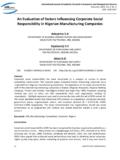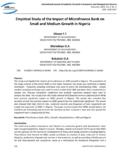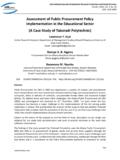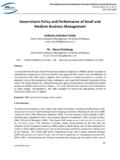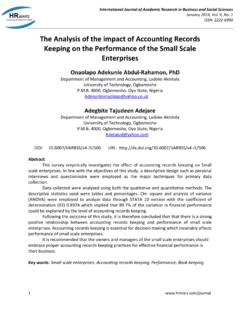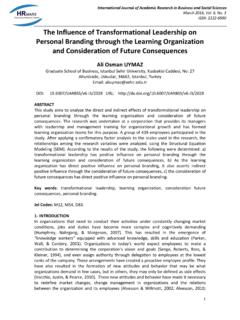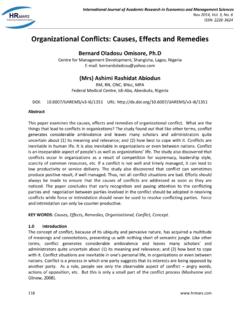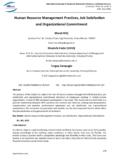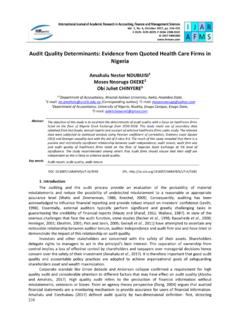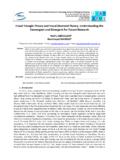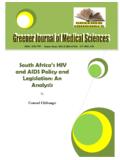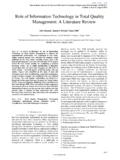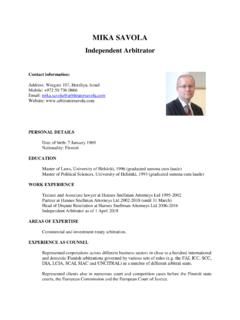Transcription of The Role Played by Ngos in Preventing the Spread of Hiv ...
1 International journal of Academic Research in Business and Social Sciences November 2013 , Vol. 3, No. 11 ISSN: 2222-6990 579 The Role Played by Ngos in Preventing the Spread of Hiv/ Aids and Supporting People Living with Hiv/Aids in Tanzania: A Case of Dar Es Salaam Region Tumpe Ndimbwa, Maria Emanuel and Emery Mushi Centre for foreign Relations (CFR), Box 2824 Dar es Salaam Correspondence email: DOI: URL: Abstract HIV has blazed throughout sub-Saharan Africa, particularly Southern Africa, leaving almost no community unaffected by its devastating effects.
2 Despite successful interventions in some countries and communities to combat the virus, it has continued to wreak its havoc at an alarming rate. This paper aimed at investigating the role Played by NGOs in Preventing the pandemic as well as supporting the infected people with HIV/AIDS. The study findings reveled that, NGOs in Tanzania play a big role in Preventing the Spread of the disease. However, In order for these organizations to be effective and efficiency more efforts from the government are needed to support these Non government organizations.
3 Key words: HIV/AIDS, NGOs Introduction The world has rapidly become more vulnerable to the eruption and the global Spread of new infectious diseases. Nothing symbolizes this new global vulnerability more than AIDS pandemic. Twenty three years after the first clinical evidence of Acquired Immunodeficiency Syndrome popularly known as AIDS was reported in the USA, it has become the most devastating pandemic humankind ever witnessed (Awake, 2002). According to UNAIDS/WHO (2006), an estimated million people were living with HIV/AIDS by 2006. There were million new infections by 2006 with million (65%) of these occurring in Sub-Saharan Africa.
4 There is also indication that in Eastern Europe and Central Asia the infection rates have risen by more than 50% since 2004. In the year 2006, the epidemic claimed the lives of an estimated million people in estimated million ( million million) adults and children were living with HIV in the United Republic of Tanzania at the end of 2005, making it one of the most affected countries in the world. According to projections, the number of new HIV infections in rural areas (where about the three quarters of the country s population live) could be twice as high as in urban areas by 2010 (UNAIDS/WHO, 2006:18).
5 To combat the Spread of this disease, the UN and the developed governments of the world have been playing an important role. For example, the US government has been in the forefront in the crusade against HIV/AIDS in Africa especially in this new millennium. As noted by the World Watch Institute, the HIV epidemic raging across Sub-Saharan Africa is a tragedy of epic proportion. In International journal of Academic Research in Business and Social Sciences November 2013 , Vol. 3, No. 11 ISSN: 2222-6990 580 the same manner. Koffi Annan (2000) while talking on the impact of HIV and AIDS in the achievement of Millennium Development goals in Africa reported that, the disease affects region s development and demographic future, reduce life expectancy and raise mortality rate and lowering fertility as well as leaving millions of orphans in its wake.
6 Acquired Immunodeficiency Syndrome (AIDS) is a world wide problem which affects every face of human life. It is caused by a virus called human immunodeficiency virus (HIV). So far neither vaccine nor cure for the disease has been discovered. This means that once people infected by the virus eventually they die. On average, an infected person dies within two to ten years. HIV/AIDS is among the leading cross-cutting challenges to national development in Tanzania. The first three AIDS cases were reported in Tanzania in 1983. Since then, HIV/AIDS has been spreading throughout Tanzania affecting urban and rural areas (Idasa, 2008).
7 Institutionalized interventions addressing HIV and AIDS in Tanzania started in 1985, with the National AIDS Control Program (NASP) being established in the same year under the Ministry of Health. Therefore, HIV/AIDS was declared a national disaster in 1999. Since then the number of cases has continued to rise at a very fast rate (Idasa, 2008). Again, according to NASP Report (2006) and TACAIDS (2005 ) it was estimated that the HIV prevalence among adults was approximately 7% in a population of 33 million by 2003 whereby approximately million people are living with HIV and AIDS on the mainland.
8 About 60% of bed occupancy is due to HIV and AIDS related illnesses in hospitals. Almost everywhere AIDS is taking a terrible toll resulting in one out of ten children being orphaned and looked after by grandparents if they are still alive. However, sometimes the eldest child has to become the bread winner sacrificing his or her own future to bring up brothers and sisters. As orphans, these children undoubtedly have a high risk of malnutrition, suffer from the stress of seeing their parents die, become surrogate parents to their younger siblings or coerced into early sexual activities and probably never see the inside of a school(ibid).
9 Concepts and Definitions NGOs. A non-governmental organization (NGO) is any non-profit, voluntary citizen s group which is organized on a local, national or international level. Task oriented and driven by people with a common interest, NGO perform a variety of service and humanitarian functions, bring citizen concerns to Governments, advocate and monitor policies and encourage political participation through provision of information. Some are organized around specific issues such as health, environment or human rights. For the sake of this study, NGOs discussed here are those particularly dealing with HIV and AIDS.
10 These are non governmental organizations mostly established by people living with HIV/AIDS, (PLWHA) WAMATA This is the oldest NGOs in Tanzania dealing with HIV/AIDS. It was formed in 1989 by a group of people living with HIV/AIDS. It has chartered the road map for most of the HIV/AIDS service NGOs and community based organizations and brought HIV/AIDS problem to the attention of government. International journal of Academic Research in Business and Social Sciences November 2013 , Vol. 3, No. 11 ISSN: 2222-6990 581 PASADA Is a social service agency operating under the Roman Catholic Archdiocese of Dar es Salaam.
